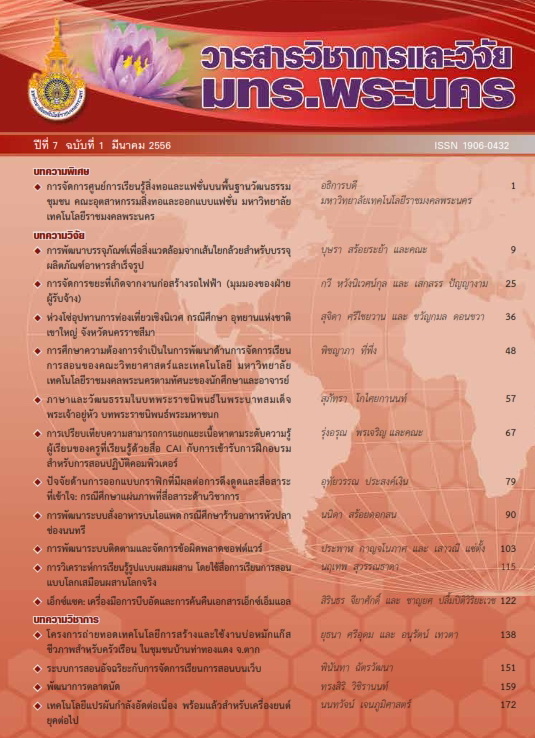ภาษาและวัฒนธรรมในบทพระราชนิพนธ์ในพระบาทสมเด็จพระเจ้าอยู่หัว บทพระราชนิพนธ์พระมหาชนก
Main Article Content
Abstract
บทคัดย่อ
การวิจัยเรื่อง “ภาษาและวัฒนธรรมในบทพระราชนิพนธ์ในพระบาทสมเด็จพระเจ้าอยู่หัวบทพระราชนิพนธ์พระมหาชนก” มีวัตถุประสงค์เพื่อศึกษาว่าผู้อ่านได้รับแนวคิดอะไรและอย่างไรจากบทพระราชนิพนธ์ วิธีการศึกษา ใช้วิธีการวิเคราะห์เนื้อความแบบอภิปรายความ (discourse analysis) ในมุมมองของภาษาและวัฒนธรรม ซึ่งจากการอ่านอย่างลึกซึ้งพบว่าด้านวัจนภาษา พระบาทสมเด็จพระเจ้าอยู่หัว ทรงเลือกเฟ้นและเรียบเรียงถ้อยคำสำนวนอย่างประณีต ได้บรรยากาศทั้งความโอ่อ่า และความขรึมขลังสมกับเป็นเรื่องอดีตชาติอันศักดิ์สิทธิ์ของพระพุทธเจ้า ในขณะเดียวกันทรงรักษาลักษณะการใช้ภาษาง่าย ๆ ตามแบบฉบับนิทานเพื่อให้คนรุ่นใหม่ได้เข้าถึงเรื่องพระมหาชนก นอกจากนี้ยังทรงปรับเปลี่ยน และเพิ่มเติมเนื้อหาให้เป็นประโยชน์ต่อสังคมไทย ด้านอวัจนภาษา มีการใช้ภาพประกอบเป็นการช่วยเล่าเรื่องและเพิ่มสีสันให้เรื่องน่าสนใจเท่านั้น การอภิปรายความด้านวัฒนธรรมพบแนวคิด 4 ด้าน คือ ด้านศาสนา ทรงใช้ความเพียรที่บริสุทธิ์ สติปัญญา และกำลังกาย ในการปกครองและสถาบันพระมหากษัตริย์ ด้านการปกครองพบว่าพระบาทสมเด็จพระเจ้าอยู่หัว ทรงเป็นผู้ปกครองแผ่นดินโดยธรรมตลอด 50 ปี ของการครองราชย์ ด้านเศรษฐกิจและสังคมทรงนำเสนอแนวทางในการดำเนินชีวิตให้แก่คนไทย ในขณะที่ประเทศไทยเกิดวิกฤตทางเศรษฐกิจ และสังคม ด้านการศึกษาได้สะท้อนคุณค่าของการศึกษาและสถาบันการศึกษาเพื่อมหาชน
Abstract
This research aimed to study the concepts that readers attain from the story of Mahajanaka, composed by His Majesty King Bhumibol Adulyadej, and how they are communicated to readers. The methodology of analysis was discourse analysis, focusing on language and culture. From a deep reading of the work, it can be seen that its words and phrases were selected and arranged in an exalted and exquisite style to praise the magical story of the Lord Buddha’s previous birth. At the same time, the story is narrated in a straightforward way to allow the younger generation entry into the work. Apart from this, certain content was adjusted to be of greater benefit to Thai society. As for non-verbal language, illustrations were used to help tell the story and make it more interesting. In terms of culture, the examination of the work found four areas of import: religion reflecting as a way of pure perseverance, sharp wisdom and complete physical health; kingship and governance, with regard to which for over fifty years king Bhumibol has been on the throne and has shown devotion to the kingly virtues; the economy and society,regarding which the author advises Thai people on how to live well during economic crisis and in society; and education, the work reflecting the value of education and institutes of learning for all.
การวิจัยเรื่อง “ภาษาและวัฒนธรรมในบทพระราชนิพนธ์ในพระบาทสมเด็จพระเจ้าอยู่หัวบทพระราชนิพนธ์พระมหาชนก” มีวัตถุประสงค์เพื่อศึกษาว่าผู้อ่านได้รับแนวคิดอะไรและอย่างไรจากบทพระราชนิพนธ์ วิธีการศึกษา ใช้วิธีการวิเคราะห์เนื้อความแบบอภิปรายความ (discourse analysis) ในมุมมองของภาษาและวัฒนธรรม ซึ่งจากการอ่านอย่างลึกซึ้งพบว่าด้านวัจนภาษา พระบาทสมเด็จพระเจ้าอยู่หัว ทรงเลือกเฟ้นและเรียบเรียงถ้อยคำสำนวนอย่างประณีต ได้บรรยากาศทั้งความโอ่อ่า และความขรึมขลังสมกับเป็นเรื่องอดีตชาติอันศักดิ์สิทธิ์ของพระพุทธเจ้า ในขณะเดียวกันทรงรักษาลักษณะการใช้ภาษาง่าย ๆ ตามแบบฉบับนิทานเพื่อให้คนรุ่นใหม่ได้เข้าถึงเรื่องพระมหาชนก นอกจากนี้ยังทรงปรับเปลี่ยน และเพิ่มเติมเนื้อหาให้เป็นประโยชน์ต่อสังคมไทย ด้านอวัจนภาษา มีการใช้ภาพประกอบเป็นการช่วยเล่าเรื่องและเพิ่มสีสันให้เรื่องน่าสนใจเท่านั้น การอภิปรายความด้านวัฒนธรรมพบแนวคิด 4 ด้าน คือ ด้านศาสนา ทรงใช้ความเพียรที่บริสุทธิ์ สติปัญญา และกำลังกาย ในการปกครองและสถาบันพระมหากษัตริย์ ด้านการปกครองพบว่าพระบาทสมเด็จพระเจ้าอยู่หัว ทรงเป็นผู้ปกครองแผ่นดินโดยธรรมตลอด 50 ปี ของการครองราชย์ ด้านเศรษฐกิจและสังคมทรงนำเสนอแนวทางในการดำเนินชีวิตให้แก่คนไทย ในขณะที่ประเทศไทยเกิดวิกฤตทางเศรษฐกิจ และสังคม ด้านการศึกษาได้สะท้อนคุณค่าของการศึกษาและสถาบันการศึกษาเพื่อมหาชน
Abstract
This research aimed to study the concepts that readers attain from the story of Mahajanaka, composed by His Majesty King Bhumibol Adulyadej, and how they are communicated to readers. The methodology of analysis was discourse analysis, focusing on language and culture. From a deep reading of the work, it can be seen that its words and phrases were selected and arranged in an exalted and exquisite style to praise the magical story of the Lord Buddha’s previous birth. At the same time, the story is narrated in a straightforward way to allow the younger generation entry into the work. Apart from this, certain content was adjusted to be of greater benefit to Thai society. As for non-verbal language, illustrations were used to help tell the story and make it more interesting. In terms of culture, the examination of the work found four areas of import: religion reflecting as a way of pure perseverance, sharp wisdom and complete physical health; kingship and governance, with regard to which for over fifty years king Bhumibol has been on the throne and has shown devotion to the kingly virtues; the economy and society,regarding which the author advises Thai people on how to live well during economic crisis and in society; and education, the work reflecting the value of education and institutes of learning for all.
Article Details
How to Cite
[1]
โกไศยกานนท์ ส., “ภาษาและวัฒนธรรมในบทพระราชนิพนธ์ในพระบาทสมเด็จพระเจ้าอยู่หัว บทพระราชนิพนธ์พระมหาชนก”, RMUTP Sci J, vol. 7, no. 1, pp. 57–66, Mar. 2014.
Section
บทความวิจัย (Research Articles)
ลิขสิทธ์ ของมหาวิทยาลัยเทคโนโลยีราชมงคลพระนคร


